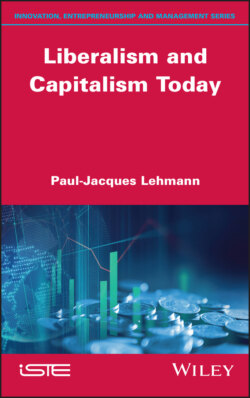Читать книгу Liberalism and Capitalism Today - Paul-Jacques Lehmann - Страница 15
1.2.1. Freedom as a condition of private property
ОглавлениеThe existence of property actually preceded its legal existence, that is, the right of ownership. For liberals, this right is real wealth, created by people, which benefits not only each individual, but also society as a whole. As long as this type of possession had its origin only in conquest, it did not need to be protected by a right, and indeed it was not. On the contrary, as soon as it was obtained through the fruits of labor, the law had to intervene: from the freedom of labor comes the desire to become rich and the right of ownership that underlies it. Property rights and freedom of contracts then become the consequence of the will of people to live together by bending to natural laws and striving to defend their own domain. These are the two indispensable sources of economic independence from political power.
From an economic point of view, property appeared as soon as people saw their needs increase: the right of ownership established the link between the efforts that the individual was led to make and the needs to which those efforts corresponded. From that moment on, they no longer lived from day to day, no longer simply satisfied their hunger, but were able to use the fruits of their property as they pleased: for de Tocqueville (2010), “man as an economic owner is born. Until then, he was only the owner of his faculties, his physical and intellectual strength, his feelings. It was simply a fact that then became an idea. It will be at the origin of an organized society and will become inseparable from the order and development of civilization”. From then on, the right of ownership would impose itself and become a sacred right. This is considered to be at the source of the constitution of nations, of their progress and ambitions.
Property is also essential for the appearance of capital, the basis of production alongside labor. Indeed, all production presupposes prior appropriation, in the same way that exchange only concerns objects belonging to someone: a person is only free to do what they want with the property they own if they are the owner. Consequently, capitalism exists only if it is based on the acceptance of private property, in particular the means of production. Private owners, in pursuit of their own interests, then have capital at their disposal to accumulate wealth.
Moreover, individual responsibility is based on private property and freedom. These three factors of capitalism are linked and have developed in parallel. First, each individual must be responsible for their choices and actions. They must be aware that life is a constant struggle, that all decisions they make involve risks and that they must take them: capitalism is the economy of risk. However, they must be optimistic for the future, because the work they will do will allow them to move up the social hierarchy and see their wealth increase. “By increasing the amount of wealth, property contributes to sociability”.
We have seen that freedom is the basis of all human activities: the existence of private property is both the condition and the consequence of this freedom. Since, henceforth, property is the result of work, it can only exist if people are free. Indeed, liberals refuse to consider work as a factor of humanity’s annihilation, but on the contrary consider it as a means of independence. Work cannot do without property any more than property can do without work: the respect accorded to work comes from the respect owed to the person, whose freedom is the fundamental characteristic. Living in the midst of owners, any individual who is not yet an owner is encouraged to become one and will be able to do so thanks to their freedom and their work.
Nonetheless, once again, de Tocqueville explained that we should not hide the fact that property leads to unequal conditions in the social state.
The right to property, like all other rights that generate freedom, can only be exercised if there is freedom of contract, which allows weak people to be protected against the arbitrariness of the powerful, who are inherently brutal. A competitive economy can only exist with strong and constantly renewed contractual commitments. The signing of contracts also constitutes the necessary counterweight to respect for others and to the word given. If the latter is broken or the rules laid down by the legislator are flouted, sanctions must be applied to the offenders. Moreover, it is in the interest of all actors that contracts regulate economic operations a priori, because it is their very security that is at stake: the integrity of each individual is in the interest of the common good and is the basis of the trust necessary for human relations. Liberalism that is not framed by the rule of law, which ensures its proper functioning, inevitably turns into anarchy.
